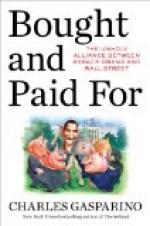Probably there was no insurance. In fact, everyone knew that there was not. Blaine had admitted as much to him some time ago. He had said then that he had only $2,000 worth, but intended getting more. Now it was too late. Only a few paltry dollars—barely enough to bury him.
The comfortably furnished room with its piano, books and pictures and other scattered evidence of culture and refinement, showed the manner in which the Blaines liked to live. Through the open window, affording a fine view of Central Park, with its rolling lawns, winding paths and masses of green foliage, came the distant sounds of busy traffic on the Avenue, ten stories below. Of course, they would have to give up all this. There was not the slightest hope for the patient. He was past human aid. It was only a question of a few hours, perhaps only minutes, when the end would come. Yet how could he break the terrible truth to this poor woman, to these children who now stood watching him, their lips not daring to give utterance to the dread question he could plainly read in their tired, red eyes?
There was an unnatural silence. When anyone spoke it was in an almost inaudible whisper. Each seemed to feel that Death, grim and awful of aspect, was stalking invisible through the room. From behind the closed door where the father and husband lay dying there came no sound. Only an occasional sob from the wife, and the movements of the two girls as they endeavored to console her, relieved the oppressive stillness. Suddenly the doctor’s eye encountered Mrs. Blaine’s searching, questioning gaze. Averting his head, he said:
“We must wait and hope for the best. You must be brave. He may rally. I don’t like the heart action. That’s what bothers me. If there’s another sinking spell—”
Mrs. Blaine laid her cold, trembling hand on his. Quickly she said:
“You won’t go away?”
He shook his head.
“Of course not. I’ll stay until the crisis is past.”
The bedchamber door opened softly and the nurse appeared, with a worried look on her face.
“What is it, nurse,” demanded the physician quickly.
“May I see you a minute, doctor?”
Dr. Everett went towards the bedroom. Mrs. Blaine was about to follow when he turned and barred the way.
“Let me see him, doctor. Please let me go in,” she pleaded.
The physician shook his head. Kindly but firmly he said:
“Not now. We may have to administer oxygen. You’d only be in the way. You are better in here taking care of your daughters. If you are needed I’ll call you.”




